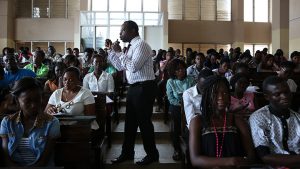The last few years have witnessed a renewed interest in the social impact of higher education. Recent discoveries have suggested that higher institutions play a huge role in nurturing developmental leaders who would enable positive change and better governance in developing countries.
This is mainly because one very crucial sector in any nation is education; it is a significant human capital development that plays a vital role in the long-term productivity and development of any state. This explains why the deteriorating state of education in Nigeria has continued to be a subject of national discourse.

The goal of Improving any nation’s educational sector is not only to achieve a better quality of life but also to impact positively on the economic and national development of the country. The provision of education is vital to promoting broad-based economic growth.
Education is the bedrock of any society; it helps train young adults and teenagers to be responsible for themselves and society. By this, they grow to develop abilities to indulge in different tasks that lead to self-actualisation.
Another core significance of education is the values it impacts on individuals, which strengthen good citizenship such as honesty, selflessness, tolerance, and personal integrity, all of which orchestrate potentials for good leadership. Since education trains an individual to be responsible, it is apt to say that if the Boko Haram sect members had received a quality education and moral training, they are most likely to abstain from violence and other immoral acts.
Despite these vital roles, education in Nigeria is yet to manifest in this regard fully, and this is due to the inherent problems in the Nigerian educational sector.
One of the fundamental problems is inadequate funding. For the educational sector in Nigeria to meaningfully impact national development, proper funding across all government tiers shouldn’t be taken with levity. If this is properly done, University staffs would have no cause to strike as most learning institutions would have improved facilities. Also, research endeavours would be enthusiastically dwelled into which will reduce brain-drain among academics and contribute to national development.
While UNESCO recommended that at least 15% to 20% of the nation’s budget be allocated to the education sector, only about 10% is being budgeted for Nigeria’s education sector for the past several years. With the inadequate funding, corruption still serves as another impediment to achieving a better educational system.
Another inherent problem is the changing political environment which leads to unstable educational policies among successive governments. As a result, education policy planners are compelled to abandon an existing policy for a new one – as it pleases the government’s political demands. This results in a lack of continuity in educational policy formulation. At the same time, a policy requires enough time to metamorphose from planning to implementation and, finally, to the review stage. It is more of political order or assertion in Nigeria, hence lacking the required synergy.